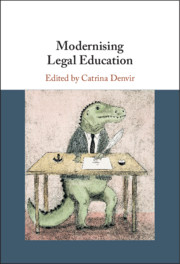Book contents
- Modernising Legal Education
- Modernising Legal Education
- Copyright page
- Contents
- Figures
- Tables
- About the Contributors
- Foreword
- Introduction
- 1 Do Lawyers Need to Learn to Code?
- 2 Experiential Legal Education
- 3 Skills Swap?
- 4 Scaling the Gap
- 5 Bringing ODR to the Legal Education Mainstream
- 6 Design Comes to the Law School
- 7 Developing ‘NextGen’ Lawyers through Project-Based Learning
- 8 Same As It Ever Was?
- 9 Ludic Legal Education from Cicero to Phoenix Wright
- 10 The Gamification of Written Problem Questions in Law
- 11 Virtually Teaching Ethics
- 12 Paths to Practice
- 13 ‘Complicitous and Contestatory’
- Afterword
- References
5 - Bringing ODR to the Legal Education Mainstream
Findings from the Field
Published online by Cambridge University Press: 30 December 2019
- Modernising Legal Education
- Modernising Legal Education
- Copyright page
- Contents
- Figures
- Tables
- About the Contributors
- Foreword
- Introduction
- 1 Do Lawyers Need to Learn to Code?
- 2 Experiential Legal Education
- 3 Skills Swap?
- 4 Scaling the Gap
- 5 Bringing ODR to the Legal Education Mainstream
- 6 Design Comes to the Law School
- 7 Developing ‘NextGen’ Lawyers through Project-Based Learning
- 8 Same As It Ever Was?
- 9 Ludic Legal Education from Cicero to Phoenix Wright
- 10 The Gamification of Written Problem Questions in Law
- 11 Virtually Teaching Ethics
- 12 Paths to Practice
- 13 ‘Complicitous and Contestatory’
- Afterword
- References
Summary
The field of dispute resolution has long been at the forefront of modernising legal education. Continuing this tradition, this chapter presents findings from an evaluation of an exercise introduced into the core law school curriculum at Monash University in Australia. In our compulsory litigation and dispute resolution units, we built an experiential exercise in which students resolved a dispute using both an online dispute resolution (ODR) platform and more traditional face-to-face mediation role-play. Students completed a short survey about their experience of the portal (n=64, response rate 30 per cent) and provided their reflective journals about the exercise for analysis (n=55). Drawing on the findings, we consider the benefits and limitations of this approach for facilitating students’ exposure to ODR. We explore themes including student understanding of ODR’s impacts on dispute processes and outcomes; appropriate conduct in dispute resolution settings; and the challenges of computer-mediated communication. We also identify means by which experiential activities can draw students’ attention to power disparities and access to justice challenges in ODR to develop their critical thinking about the rapid developments in this field.
Keywords
- Type
- Chapter
- Information
- Modernising Legal Education , pp. 92 - 108Publisher: Cambridge University PressPrint publication year: 2020

